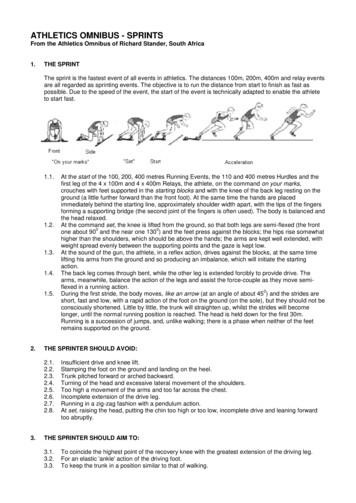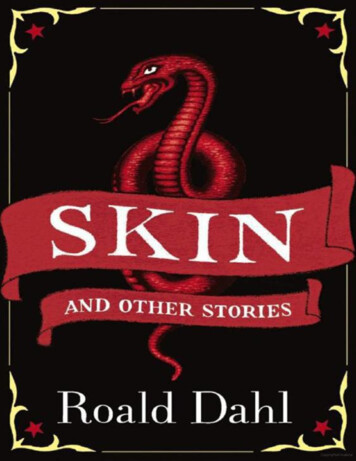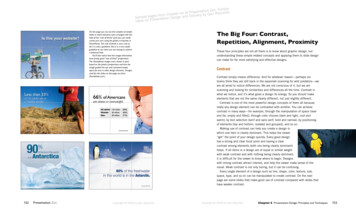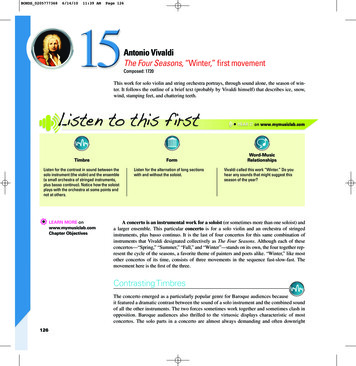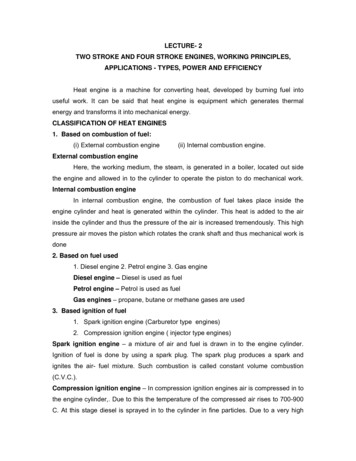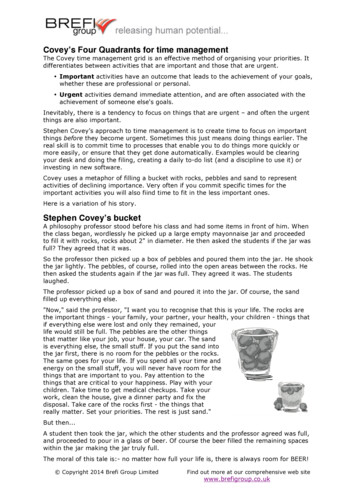
Transcription
ContentsFour: The Transfer: A Divergent StoryFour: The Initiate: A Divergent StoryFour: The Son: A Divergent StoryFour: The Traitor: A Divergent StoryBack AdAbout the AuthorBooks by Veronica RothCreditsAbout the Publisher
The Transfer: A Divergent StoryI EMERGE FROM the simulation with a yell. My lip stings, and when I take my hand away from it, thereis blood on my fingertips. I must have bitten it during the test.The Dauntless woman administering my aptitude test—Tori, she said her name was—gives me astrange look as she pulls her black hair back and ties it in a knot. Her arms are marked up and downwith ink, flames and rays of light and hawk wings.“When you were in the simulation . . . were you aware that it wasn’t real?” Tori says to me as sheturns off the machine. She sounds and looks casual, but it’s a studied casualness, learned from years ofpractice. I know it when I see it. I always do.Suddenly I’m aware of my own heartbeat. This is what my father said would happen. He told methat they would ask me if I was aware during the simulation, and he told me what to say when theydid.“No,” I say. “If I was, do you think I would have chewed through my lip?”Tori studies me for a few seconds, then bites down on the ring in her lip before she says,“Congratulations. Your result was textbook Abnegation.”I nod, but the word “Abnegation” feels like a noose wrapped around my throat.“Aren’t you pleased?” she says.“My faction members will be.”“I didn’t ask about them, I asked about you.” Tori’s mouth and eyes turn down at the corners likethey bear little weights. Like she’s sad about something. “This is a safe room. You can say whateveryou want here.”I knew what my choices in the aptitude test would add up to before I arrived at school this morning.I chose food over a weapon. I threw myself in the path of the dog to save the little girl. I knew thatafter I made those choices, the test would end and I would receive Abnegation as a result. And I don’tknow that I would have made different choices if my father hadn’t coached me, hadn’t controlledevery part of my aptitude test from afar. So what was I expecting? What faction did I want?Any of them. Any of them but Abnegation.“I’m pleased,” I say firmly. I don’t care what she says—this isn’t a safe room. There are no saferooms, no safe truths, no safe secrets to tell.I can still feel the dog’s teeth closing around my arm, tearing my skin. I nod to Tori and starttoward the door, but just before I leave, her hand closes around my elbow.“You’re the one who has to live with your choice,” she says. “Everyone else will get over it, moveon, no matter what you decide. But you never will.”I open the door and walk out.I return to the cafeteria and sit down at the Abnegation table, among the people who barely know me.My father doesn’t permit me to come to most community events. He claims that I’ll cause adisruption, that I’ll do something to hurt his reputation. I don’t care. I’m happier in my room, in thesilent house, than surrounded by the deferential, apologetic Abnegation.The consequence of my constant absence, though, is that the other Abnegation are wary of me,convinced there’s something wrong with me, that I’m ill or immoral or strange. Even those willing to
nod at me in greeting don’t quite meet my eyes.I sit with my hands clenching my knees, watching the other tables, while the other students finishtheir aptitude tests. The Erudite table is covered in reading material, but they aren’t all studying—they’re just making a show of it, trading conversation instead of ideas, their eyes snapping back to thewords every time they think someone’s watching them. The Candor are talking loudly, as always. TheAmity are laughing, smiling, pulling food from their pockets and passing it around. The Dauntless areraucous and loud, slung over the tables and chairs, leaning on one another and poking one another andteasing.I wanted any other faction. Any other faction but mine, where everyone has already decided that Iam not worth their attention.Finally an Erudite woman enters the cafeteria and holds up a hand for silence. The Abnegation andErudite quiet down right away, but it takes her shouting “Quiet!” for the Dauntless, Amity, and Candorto notice her.“The aptitude tests are now finished,” she says. “Remember that you are not permitted to discussyour results with anyone, not even your friends or family. The Choosing Ceremony will be tomorrowat the Hub. Plan to arrive at least ten minutes before it begins. You are dismissed.”Everyone rushes toward the doors except our table, where we wait for everyone else to leave beforewe even get to our feet. I know the path my fellow Abnegation will take out of here, down the hallwayand out the front doors to the bus stop. They could be there for over an hour letting other people get onin front of them. I don’t think I can bear any more of this silence.Instead of following them, I slip out a side door and into an alley next to the school. I’ve taken thisroute before, but usually I creep along slowly, not wanting to be seen or heard. Today all I want to dois run.I sprint to the end of the alley and into the empty street, leaping over a sinkhole in the pavement.My loose Abnegation jacket snaps in the wind, and I peel it from my shoulders, letting it trail behindme like a flag and then letting it go. I push the sleeves of my shirt up to my elbows as I run, slowing toa jog when my body can no longer stand the sprint. It feels like the entire city is rushing past me in ablur, the buildings blending together. I hear the slap of my shoes like the sound is separate from me.Finally I have to stop, my muscles burning. I’m in the factionless wasteland that lies between theAbnegation sector and Erudite headquarters, Candor headquarters, and our common places. At everyfaction meeting, our leaders, usually speaking through my father, urge us not to be afraid of thefactionless, to treat them like human beings instead of broken, lost creatures. But it never occurred tome to be afraid of them.I move to the sidewalk so I can look through the windows of the buildings. Most of the time all Isee is old furniture, every room bare, bits of trash on the floor. When most of the city’s residents left—as they must have, since our current population doesn’t fill every building—they must not have leftin a hurry, because the spaces they occupied are so clean. Nothing of interest remains.When I pass one of the buildings on the corner, though, I see something inside. The room justbeyond the window is as bare as any of the others I’ve walked by, but past the doorway inside I cansee a single ember, a lit coal.I frown and pause in front of the window to see if it will open. At first it won’t budge, and then Iwiggle it back and forth, and it springs upward. I push my torso through first, and then my legs,toppling to the ground inside in a heap of limbs. My elbows sting as they scrape the floor.The building smells like cooked food and smoke and sweat. I inch toward the ember, listening forvoices that will warn me of a factionless presence here, but there’s only silence.
In the next room, the windows are blacked out by paint and dirt, but a little daylight makes itthrough them, so I can see that there are curled pallets scattered on the floor all over the room, and oldcans with bits of dried food stuck inside them. In the center of the room is a small charcoal grill. Mostof the coals are white, their fuel spent, but one is still lit, suggesting that whoever was here was hererecently. And judging by the smell and the abundance of old cans and blankets, there were quite a fewof them.I was always taught that the factionless lived without community, isolated from one another. Now,looking at this place, I wonder why I ever believed it. What would be stopping them from forminggroups, just like we have? It’s in our nature.“What are you doing here?” a voice demands, and it travels through me like an electric shock. Iwheel around and see a smudged, sallow-faced man in the next room, wiping his hands on a raggedtowel.“I was just . . .” I look at the grill. “I saw fire. That’s all.”“Oh.” The man tucks the corner of the towel into his back pocket. He wears black Candor pants,patched with blue Erudite fabric, and a gray Abnegation shirt, the same as the one I’m wearing. He’slean as a rail, but he looks strong. Strong enough to hurt me, but I don’t think he will.“Thanks, I guess,” he says. “Nothing’s on fire here, though.”“I can see that,” I say. “What is this place?”“It’s my house,” he says with a cold smile. He’s missing one of his teeth. “I didn’t know I would behaving guests, so I didn’t bother to tidy up.”I look from him to the scattered cans. “You must toss and turn a lot, to require so many blankets.”“Never met a Stiff who pried so much into other people’s business,” he says. He moves closer to meand frowns. “You look a little familiar.”I know I can’t have met him before, not where I live, surrounded by identical houses in the mostmonotonous neighborhood in the city, surrounded by people in identical gray clothing with identicalshort hair. Then it occurs to me: hidden as my father tries to keep me, he’s still the leader of thecouncil, one of the most prominent people in our city, and I still resemble him.“I’m sorry to have bothered you,” I say in my best Abnegation voice. “I’ll be going now.”“I do know you,” the man says. “You’re Evelyn Eaton’s son, aren’t you?”I stiffen at her name. It’s been years since I heard it, because my father won’t speak it, won’t evenacknowledge it if he hears it. To be connected to her again, even just in facial resemblance, feelsstrange, like putting on an old piece of clothing that doesn’t quite fit anymore.“How did you know her?” He must have known her well, to see her in my face, which is paler thanhers, the eyes blue instead of dark brown. Most people didn’t look closely enough to see all the thingswe had in common: our long fingers, our hooked noses, our straight, frowned eyebrows.He hesitates a little. “She volunteered with the Abnegation sometimes. Handing out food andblankets and clothes. Had a memorable face. Plus, she was married to a council leader. Didn’teveryone know her?”Sometimes I know people are lying just because of the way the words feel when they press into me,uncomfortable and wrong, the way an Erudite feels when she reads a grammatically incorrectsentence. However he knew my mother, it’s not because she handed him a can of soup once. But I’mso thirsty to hear more about her that I don’t press the issue.“She died, did you know?” I say. “Years ago.”“No, I didn’t know.” His mouth slants a little at one corner. “I’m sorry to hear that.”I feel strange, standing in this dank place that smells like live bodies and smoke, among these
empty cans that suggest poverty and the failure to fit in. But there is something appealing about it heretoo, a freedom, a refusal to belong to these arbitrary categories we’ve made for ourselves.“Your Choosing must be coming up tomorrow, for you to look so worried,” the man says. “Whatfaction did you get?”“I’m not supposed to tell anyone,” I say automatically.“I’m not anyone,” he says. “I’m nobody. That’s what being factionless is.”I still don’t say anything. The prohibition against sharing my aptitude test result, or any of my othersecrets, is set firmly in the mold that makes me and remakes me daily. It’s impossible to change now.“Ah, a rule follower,” he says, like he’s disappointed. “Your mother said to me once that she feltlike inertia had carried her to Abnegation. It was the path of least resistance.” He shrugs. “Trust mewhen I tell you, Eaton boy, that resisting is worth doing.”I feel a rush of anger. He shouldn’t be telling me about my mother like she belongs to him and notto me, shouldn’t be making me question everything I remember about her just because she may ormay not have served him food once. He shouldn’t be telling me anything at all—he’s nobody,factionless, separate, nothing.“Yeah?” I say. “Look where resisting got you. Living out of cans in broken-down buildings. Doesn’tsound so great to me.” I start toward the doorway the man emerged from. I know I’ll find an alleydoor somewhere back there; I don’t care where as long as I can get out of here quickly.I pick a path across the floor, careful not to step on any of the blankets. When I reach the hallway,the man says, “I’d rather eat out of a can than be strangled by a faction.”I don’t look back.When I get home, I sit on the front step and take deep breaths of the cool spring air for a few minutes.My mother was the one who taught me to steal moments like these, moments of freedom, thoughshe didn’t know it. I watched her take them, slipping out the door after dark when my father wasasleep, creeping back home when sunlight was just appearing behind the buildings. She took themeven when she was with us, standing over the sink with her eyes closed, so distant from the presentthat she didn’t even hear me when I spoke to her.But I learned something else from watching her too, which is that the free moments always have toend.I get up, brushing flecks of cement from my gray slacks, and push the door open. My father sits inthe easy chair in the living room, surrounded by paperwork. I pull up straight, tall, so that he can’tscold me for slouching. I move toward the stairs. Maybe he will let me go to my room unnoticed.“Tell me about your aptitude test,” he says, and he points at the sofa for me to sit.I cross the room, stepping carefully over a stack of papers on the carpet, and sit where he points,right on the edge of the cushion so I can stand up quickly.“Well?” He removes his glasses and looks at me expectantly. I hear tension in his voice, the kindthat only develops after a difficult day at work. I should be careful. “What was your result?”I don’t even think about refusing to tell him. “Abnegation.”“And nothing else?”I frown. “No, of course not.”“Don’t give me that look,” he says, and my frown disappears. “Nothing strange happened with yourtest?”During my test, I knew where I was—I knew that while I felt like I was standing in the cafeteria of
my secondary school, I was actually lying prostrate on a chair in the aptitude test room, my bodyconnected to a machine by a series of wires. That was strange. But I don’t want to talk to him about itnow, not when I can see the stress brewing inside him like a storm.“No,” I say.“Don’t lie to me,” he says, and he seizes my arm, his fingers tight like a vise. I don’t look at him.“I’m not,” I say. “I got Abnegation, just as expected. The woman barely looked at me on my wayout of the room. I promise.”He releases me. My skin pulses from where he gripped it.“Good,” he says. “I’m sure you have some thinking to do. You should go to your room.”“Yes, sir.”I get up and cross the room again, relieved.“Oh,” he says. “Some of my fellow council members are coming over tonight, so you should eatdinner early.”“Yes, sir.”Before the sun goes down, I snatch food from the cupboards and the refrigerator: two dinner rolls andraw carrots with the greens still attached, a hunk of cheese and an apple, leftover chicken without anyseasoning on it. The food all tastes the same, like dust and paste. I keep my eyes fixed on the door so Idon’t collide with my father’s coworkers. He wouldn’t like it if I was still down here when they came.I am finishing off a glass of water when the first council member appears on the doorstep, and Ihurry through the living room before my father reaches the door. He waits with his hand on the knob,his eyebrows raised at me as I slip around the banister. He points up the stairs and I climb them, fast,as he opens the door.“Hello, Marcus.” I recognize the voice as Andrew Prior’s. He’s one of my father’s closest friends atwork, which means nothing, because no one really knows my father. Not even me.From the top of the stairs I look down at Andrew. He’s wiping his shoes on the mat. I see him andhis family sometimes, a perfect Abnegation unit, Natalie and Andrew, and the son and daughter—nottwins, but both two years younger than I am in school—all walking sedately down the sidewalk andbobbing their heads at passersby. Natalie organizes all the factionless volunteer efforts among theAbnegation—my mother must have known her, though she rarely attended Abnegation social events,preferring to keep her secrets like I keep mine, hidden away in this house.Andrew meets my eyes, and I rush down the hallway to my bedroom, closing the door behind me.To all appearances, my room is as sparse and clean as every other Abnegation room. My gray sheetsand blankets are tucked tightly around the thin mattress, and my schoolbooks are stacked in a perfecttower on my plywood desk. A small dresser that contains several identical sets of clothing stands nextto the small window, which lets in only the barest sliver of sunlight in the evenings. Through it I cansee the house next door, which is just the same as the one I’m in, except five feet to the east.I know how inertia carried my mother to Abnegation, if indeed that man was speaking the truthabout what she’d told him. I can see it happening to me, too, tomorrow when I stand among the bowlsof faction elements with a knife in my hand. There are four factions I don’t know or trust, withpractices I don’t understand, and only one that is familiar, predictable, comprehensible. If choosingAbnegation won’t lead me to a life of ecstatic happiness, at least it will lead me to a comfortableplace.I sit on the edge of the bed. No, it won’t, I think, and then I swallow the thought down, because I
know where it comes from: the childish part of me that is afraid of the man holding court in the livingroom. The man whose knuckles I know better than his embrace.I make sure the door is closed and wedge the desk chair under the knob just in case. Then I crouchnext to the bed and reach under it to the trunk I keep there.My mother gave it to me when I was young, and told my father it was for spare blankets, that shehad found it in an alley somewhere. But when she put it in my room, she didn’t fill it with spareblankets. She closed my door and touched her fingers to her lips and set it on my bed to open it.Inside the unlocked trunk was a blue sculpture. It looked like falling water, but it was really glass,perfectly clear, polished, flawless.“What does it do?” I asked her at the time.“It doesn’t do anything obvious,” she said, and she smiled, but the smile was tight, like she wasafraid of something. “But it might be able to do something in here.” She tapped her chest, right overthe sternum. “Beautiful things sometimes do.”Since then I have filled the trunk with objects that others would call useless: old spectacles withoutglass in them, fragments of discarded motherboards, spark plugs, stripped wires, the broken neck of agreen bottle, a rusted knife blade. I don’t know if my mother would have called them beautiful, oreven if I would, but each of them struck me the same way that sculpture did, as secret things, andvaluable ones, if only because they were so overlooked.Instead of thinking about my aptitude test result, I pick up each object and turn it in my hands soI’ve memorized every part of every one.I wake with a start to Marcus’s footsteps in the hallway just outside the bedroom. I’m lying on the bedwith the objects strewn on the mattress around me. His footsteps are slowing down as he comes closerto the door, and I pick up the spark plugs and motherboard pieces and wires and throw them back intothe trunk and lock it, stowing the key in my pocket. I realize at the last second, as the doorknob startsto move, that the sculpture is still out, so I shove it under the pillow and slide the trunk under the bed.Then I dive toward the chair and pull it from under the knob so my father can enter.When he does, he eyes the chair in my hands with suspicion.“What was that doing over here?” he says. “Are you trying to keep me out?”“No, sir.”“That’s the second time you’ve lied to me today,” Marcus says. “I didn’t raise my son to be a liar.”“I—” I can’t think of a single thing to say, so I just close my mouth and carry the chair back to mydesk where it belongs, right behind the perfect stack of schoolbooks.“What were you doing in here that you didn’t want me to see?”I clutch the back of the chair, hard, and stare at my books.“Nothing,” I say quietly.“That’s three lies,” he says, and his voice is low but hard as flint. He starts toward me, and I back upinstinctively. But instead of reaching for me, he bends down and pulls the trunk from beneath the bed,then tries the lid. It doesn’t budge.Fear slides into my gut like a blade. I pinch the hem of my shirt, but I can’t feel my fingertips.“Your mother claimed this was for blankets,” he says. “Said you got cold at night. But what I’vealways wondered is, if it still has blankets in it, why do you keep it locked?”He holds out his hand, palm up, and raises his eyebrows at me. I know what he wants—the key. AndI have to give it to him, because he can see when I’m lying; he can see everything about me. I reach
into my pocket, then drop the key in his hand. Now I can’t feel my palms, and the breathing is starting,the shallow breathing that always comes when I know he’s about to explode.I close my eyes as he opens the trunk.“What is this?” His hand moves through the treasured objects carelessly, scattering them to the leftand right. He takes them out one by one and thrusts them toward me. “What do you need with this, orthis . . . !”I flinch, over and over again, and don’t have an answer. I don’t need them. I don’t need any of them.“This is rank with self-indulgence!” he shouts, and he shoves the trunk off the edge of the bed so itscontents scatter all over the floor. “It poisons this house with selfishness!”I can’t feel my face, either.His hands collide with my chest. I stumble back and hit the dresser. Then he draws his hand back byhis face to hit me, and I say, my throat tight with fear, “The Choosing Ceremony, Dad!”He pauses with his hand raised, and I cower, shrinking back against the dresser, my eyes too blurryto see out of. He usually tries not to bruise my face, especially for days like tomorrow, when so manypeople will be staring at me, watching me choose.He lowers his hand, and for a second I think the violence is over, the anger stalled. But then he says,“Fine. Stay here.”I sag against the dresser. I know better than to think he’ll leave and mull things over and come backapologizing. He never does that.He will return with a belt, and the stripes he carves into my back will be easily hidden by a shirt andan obedient Abnegation expression.I turn around, a shudder claiming my body. I clutch the edge of the dresser and wait.That night I sleep on my stomach, pain biting each thought, with my broken possessions on the flooraround me. After he hit me until I had to stuff my fist into my mouth to muffle a scream, he stompedon each object until it was broken or dented beyond recognition, then threw the trunk into the wall sothe lid broke from the hinges.The thought surfaces: If you choose Abnegation, you will never get away from him.I push my face into my pillow.But I’m not strong enough to resist this Abnegation-inertia, this fear that drives me down the pathmy father has set for me.The next morning I take a cold shower, not to conserve resources as the Abnegation instruct, butbecause it numbs my back. I dress slowly in my loose, plain Abnegation clothes, and stand in front ofthe hallway mirror to cut my hair.“Let me,” my father says from the end of the hallway. “It’s your Choosing Day, after all.”I set the clippers down on the ledge created by the sliding panel and try to straighten up. He standsbehind me, and I avert my eyes as the clippers start to buzz. There’s only one guard for the blade, onlyone length of hair acceptable for an Abnegation male. I wince as his fingers stabilize my head, andhope he doesn’t see it, doesn’t see how even his slightest touch terrifies me.“You know what to expect,” he says. He covers the top of my ear with one hand as he drags theclippers over the side of my head. Today he’s trying to protect my ear from getting nicked by clippers,and yesterday he took a belt to me. The thought feels like poison working through me. It’s almostfunny. I almost want to laugh.
“You’ll stand in your place; when your name is called, you’ll go forward to get your knife. Thenyou’ll cut yourself and drop the blood into the right bowl.” Our eyes meet in the mirror, and he presseshis mouth into a near-smile. He touches my shoulder, and I realize that we are about the same heightnow, about the same size, though I still feel so much smaller.Then he adds gently, “The knife will only hurt for a moment. Then your choice will be made, and itwill all be over.”I wonder if he even remembers what happened yesterday, or if he’s already shoved it into a separatecompartment in his mind, keeping his monster half separate from his father half. But I don’t havethose compartments, and I can see all his identities layered over one another, monster and father andman and council leader and widower.And suddenly my heart is pounding so hard, my face is so hot, I can barely stand it.“Don’t worry about me handling the pain,” I say. “I’ve had a lot of practice.”For a second his eyes are like daggers in the mirror, and my strong anger is gone, replaced byfamiliar fear. But all he does is switch off the clippers and set them on the ledge and walk down thestairs, leaving me to sweep up the trimmed hair, to brush it from my shoulders and neck, to put theclippers away in their drawer in the bathroom.Then I go back into my room and stare at the broken objects on the floor. Carefully, I gather theminto a pile and put them in the wastebasket next to my desk, piece by piece.Wincing, I come to my feet. My legs are shaking.In that moment, staring at the bare life I’ve made for myself here, at the destroyed remnants of whatlittle I had, I think, I have to get out.It’s a strong thought. I feel its strength ringing inside me like the toll of a bell, so I think it again. Ihave to get out.I walk toward the bed and slide my hand under the pillow, where my mother’s sculpture is still safe,still blue and gleaming with morning light. I put it on my desk, next to the stack of books, and leavemy bedroom, closing the door behind me.Downstairs, I’m too nervous to eat, but I stuff a piece of toast into my mouth anyway so my fatherwon’t ask me any questions. I shouldn’t worry. Now he’s pretending I don’t exist, pretending I’m notflinching every time I have to bend down to pick something up.I have to get out. It’s a chant now, a mantra, the only thing I have left to hold on to.He finishes reading the news the Erudite release every morning, and I finish washing my owndishes, and we walk out of the house together without speaking. We walk down the sidewalk, and hegreets our neighbors with a smile, and everything is always in perfect order for Marcus Eaton, exceptfor his son. Except for me; I am not in order, I am in constant disarray.But today, I’m glad for that.We get on the bus and stand in the aisle to let others sit down around us, the perfect picture ofAbnegation deference. I watch the others get on, Candor boys and girls with loud mouths, Erudite withstudious stares. I watch the other Abnegation rise from their seats to give them away. Everyone isgoing to the same place today—the Hub, a black pillar in the distance, its two prongs stabbing the sky.When we get there, my father puts a hand on my shoulder as we walk to the entrance, sendingshocks of pain through my body.I have to get out.It’s a desperate thought, and the pain only spurs it on with each footstep as I walk the stairs to theChoosing Ceremony floor. I struggle for air, but it’s not because of my aching legs; it’s because of myweak heart, growing stronger with each passing second. Beside me, Marcus wipes beads of sweat from
his forehead, and all the other Abnegation close their lips to keep from breathing too loudly, lest theyappear to be complaining.I lift my eyes to the stairs ahead of me, and I am on fire with this thought, this need, this chance toescape.We reach the right floor, and everyone pauses to catch their breath before entering. The room isdim, the windows blocked off, the seats arranged around the circle of bowls that hold glass and waterand stones and coal and earth. I find my place in line, between an Abnegation girl and an Amity boy.Marcus stands in front of me.“You know what to do,” he says, and it’s more like he’s telling himself than me. “You know whatthe right choice is. I know you do.”I just stare somewhere south of his eyes.“I’ll see you soon,” he says.He moves toward the Abnegation section and sits in the front row, with some of the other councilleaders. Gradually people fill the room, those who are about to choose standing in a square at the edge,those watching sitting in the chairs in the middle. The doors close, and there’s a moment of quiet asthe council representative from Dauntless moves to the podium. Max is his name. He wraps hisfingers around the edge of the podium, and I can see, even from here, that his knuckles are bruised.Do they learn to fight in Dauntless? They must.“Welcome to the Choosing Ceremony,” Max says, his deep voice filling the room easily. He doesn’tneed the microphone; his voice is loud enough and strong enough to penetrate my skull and wraparound my brain. “Today you will choose your factions. Until this point you have followed yourparents’ paths, your parents’ rules. Today you will find your own path, make your own rules.”I can almost see my father pressing his lips together with disdain at such a typical Dauntless speech.I know his habits so well, I almost do it myself, though I don’t share the feeling. I have no particularopinions about Dauntless.“A long time ago our ancestors realized that each of
The Transfer: A Divergent Story I EMERGE FROM the simulation with a yell. My lip stings, and when I take m
